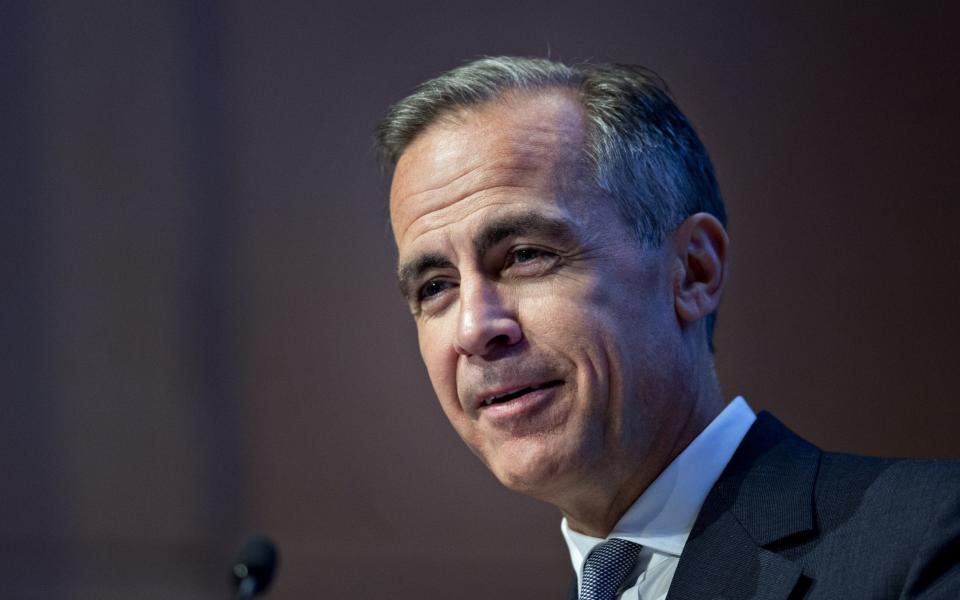Mark Carney begs politicians not to rip up new financial rulebook

Regulators are like referees. Do well and they get ignored. But, on the flip side, every little mistake is scrutinised and criticised to the Nth degree. So, now and then, it’s worth being magnanimous and saying: you know what, fair’s fair, the man in black had a good game.
The effect is, however, a little spoiled if it’s the referee who is patting himself on the back. Mark Carney didn’t unfurl a banner declaring “mission accomplished” during his speech (delivered more in his capacity as chairman of the Financial Stability Board than as Governor of the Bank of England) at the IIF’s Washington Policy Summit. But he did – entirely fairly – point out that financial regulation is in a much better place than it was 10 years ago.
In the lead up to the financial crisis, banks around the world were too big to fail and grossly undercapitalised (some were levered over 50 times), parts of the derivatives markets bore a resemblance to the Wild West and there was little confidence that further nasties weren’t lurking in the shadow banking system, among companies that did the kinds of things banks did but weren’t subject to same rules and scrutiny.
Today, these worries have been significantly lessened. Most of the banks are far better capitalised. Between them, global lenders have raised more than $1.5 trillion of capital in the past few years, according to Carney, and the capital requirements for the biggest banks are now 10 times higher than they were a decade ago. Their sources of funding are no longer so short term and liable to be whisked away at a moment’s notice.
Many banks were made to reduce their leverage, kicking and screaming. They claimed that if they had to hold more equity then they wouldn’t be able to lend money to companies that needed it to invest in their business and the economy.
This sounded like it made sense but was actually untrue. Investors are more willing to lend money to banks that are well capitalised. This reduces their cost of capital. As Carney said: “It has been apparent for some time that having well-capitalised, liquid banks is a pre-requisite – rather than an impediment – to growth. In those economies where reform has moved the quickest, the recoveries have been the most robust.” Still not convinced? Well, would you lend money to an Italian bank?
American banks, which were forced to take their medicine quickly after the financial crisis and subsequently recovered much faster than their European counterparts, some of whom, naming no names, are still struggling to catch up (cough Deutsche Bank cough)
Regulators have also got to grips with the derivatives markets, by forcing many of the contracts that were arranged privately between the two sides of the deal on to exchanges and through central clearing, where regulators can keep better track of what’s going on.
Financial activities are subject to the same rules regardless of where they are conducted and by whom. Shadow banking has, broadly speaking, moved out of the shadows. And fund managers are becoming much more important sources of investment, which reduces the economy’s reliance on bank financing. Global assets under management have grown from $50 trillion at the time of the financial crisis to $77 trillion, according to Carney, meaning that they are now equivalent to 40pc of total assets in the financial system.
And yet. It’s true that big banks are less likely to go pop now than 10 years ago. But if they did, it would still make a heck of a mess. The recovery and resolutions systems – which the ring-fencing of banks in the UK, for example, are part of – remain incomplete. Central clearing of derivatives reduces the riskiness of banks but also means that we have to start worrying whether central clearing counterparty houses are themselves becoming too big and too important to fail (and who might be picking up the cheque if they did). The increasing importance of fund managers means that they, too, should probably be subjected to more scrutiny.
So, financial regulation is in a much better place than it was, but more needs to be done. Regulators need to ensure the rules they have laid out are implemented and, if necessary, tweaked to avoid unintended consequences; they must remain vigilant for new risks.
And they must, Carney insists, collaborate. Speaking in Washington but studiously avoiding any mention of President Trump, the Governor of the Bank of England warned against the risk of regulatory “Balkanisation”, with local authorities potentially rolling back some rules for their own banks and creating more onerous ones for foreign banks operating in their jurisdiction. Regulators in different countries are stronger, said Carney, if they work together.
“Brexit,” he argued, “will be a litmus test of the future of international cooperation.” The UK and the rest of the EU will, after all, be parting ways in possession of the same rules. The markets, systems and supervision already highly integrated.
The subtext of the speech, delivered in the US seat of government and source of many recent rumblings about greater protectionism and deregulation, was clear: we’ve come so far, don’t let all the hard work be undone by politics.

 Yahoo Finance
Yahoo Finance 